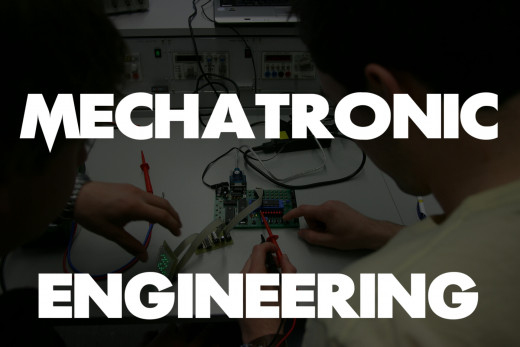What Is Mechatronic Engineering?

Mechatronic engineering is the integration of mechanical, electrical and computer systems. The name looks geeky and odd to the non-engineering community because it doesn't point out to anything in particular. And it does not seem to be derived from an obvious property or object of study like many other engineering disciplines.
For instance, electronic engineering can be easily traced down to realise that it's a study of electronic stuff. But when the word mechatronic pops up, lots of folks have no idea at all.
So I've just dedicated this post to help you grasp what mechatronic engineering is. And as you'll discover real soon, it's nothing new. Enough introductions, lets dive in.
Definition of mechatronic engineering
The discipline is fairly young and there hasn't been a satisfactory definition for it. The definition keeps changing and evolving to accommodate the expanding totality of it. But generally, all those definitions have this description in common.
Mechatronic engineering is a combination of mechanical engineering and electronic engineering. It's like the baby that is made when mechanical engineering gets married to electronics. And the baby sitter will be computer control mechanisms. This is the kind of relationship that all the diversified definitions you'll find in the ever-growing volumes of text books are trying to say.
The "mecha" is derived from mechanical and the "tronics" is derived from electronic. But what does being a combination mean here? Let me illustrate that with a mechatronic product that is popular, a remote-controlled drone.

A drone has a mechanical side: the blades, fitted cameras. A drone also has an electronic side: the switching circuitry, antennas. The electronic side is embedded in the mechanical side and they're further integrated by a computational control system that keep the mechanical and electronic part in sync and working together to reach a single goal.
This integration is so seamless that it is now difficult to tell the boundaries between the mechanical and electronic parts. So it's just to say mechatronic engineering is an inevitable result of the combined advancement of multiple engineering disciplines.
Not only mechanical and electronic, but other disciplines like information technology, computer science, electrical and civil engineering are also getting absorbed into the mechatronic engineering discipline.
No wonder there hasn't been a single and distinct definition for mechatronic engineering. It is still taking form with each significant advancement in technology and as it does the definition changes.
The former definition feels like it's incomplete after an advancement or further integration or new inter-relation. So engineers keep making up definitions to fit the current form of mechatronic engineering. There you have it, that's the general scope of what mechatronic engineering is. It's not entirely a new thing, it's only the result of old engineering disciplines getting more related and advanced as a single discipline.
Why mechatronic engineering is getting popular?
Wait a minute. How did you hear about mechatronics? What made you take so much interest that you ended up on this blog post just to know more about it? It's getting popular and I'll explain to you why.
There has never been a time more exciting and full of potential in the engineering realm as the twenty first century. Things never thought possible have come and more is certainly coming because of the advancement and marriages of once parallel engineering disciplines.
This is the sole reason why it was extremely necessary to make these marriages a single discipline which we now call mechatronic engineering.
The potential is ridiculously huge and the level of change it can bring is out of this world. That's not an expression, I actually mean out of this world. We're talking about bringing characters like Iron man into reality.
Yes, I said iron man. That fictitious character now has significant possibility of becoming real through mechatronic engineering developments.

And the other interesting thing is that these developments affect a wide range of fields. The medical field, industry, military, entertainment, aerospace and more.
The products made are more efficient yet cost much less to make compared to the products made during the times when mechanical and electronic disciplines were still less merged to each other.
And this has made mechatronic products get more attention and more investment. Billions of dollars are getting injected to develop and upgrade mechatronic systems and products. From small foldable smartphones to full-scale geostationary satellites.
All this creates the noise you hear about mechatronic engineering. And educational institutions keep marketing this discipline to the young people. The more people get into this mechatronic engineering discipline, the more research and development there will be in that area of study. And I'll leave to you the imagination of the fictitious world that will follow after that.
Should you study mechatronic engineering?
This hub post has been very cheesy and cool so far but I'll be a little blunt here for the sake of honesty. There are people who say anything is possible if you believe and there are some who say you can learn literally anything.
This may work with tasks that need relatively low levels of commitment and of low levels of difficulty. That's my view which is open to criticism in the comments section.
The stuff that gets developed by mechatronic engineers is what is deemed by the general republic as cool. And also the job market for mechatronic engineers is very sexy worldwide. These reasons make up the motivation most people have when they go on the quest to study mechatronic engineering.
But what lots of folks overlook is the level of commitment and obsession that is needed. This applies to many engineering disciplines too. It's just not easy.
There are so many layers of frustration and pressure you can't penetrate with just hard work and the never-quit spirit. You need passion, obsession and a lot of math to become the competent mechatronic engineer that would one day push the edge of technology or develop the next billion-dollar product. You seriously need a very strong background of math.

Many universities are now teaching mechatronic engineering at undergraduate level. So most of the people coming into the field are young adults. And it is most among these kind of people that lack guidance. If you're one of those people coming or intending to come into the field, read the next paragraph very slowly. It's important.
Only go on the quest to study mechatronic engineering if and only if you're a math person. If math and programming felt like fighting an immortal zombie in high school, then don't go for the quest.
No matter how motivated you are, no matter how much you believe in yourself, if you're not a math person then you're not mechatronic engineering material. Be honest with yourself, and then make a decision with nobody pushing you.
That was really blunt, but I felt it should be said so that you make a decision with enough knowledge of what you'll need to strive in this field of study. I'm also a college guy studying mechatronic engineering and I keep seeing folks coming with no clear sight of what they're getting into.
And they lose morale and waste years either to become an incompetent engineer or quit the degree program entirely. You don't want that to happen to you.
Mechatronic engineering jobs
As more and more businesses embrace technology, the demand for the skills of a mechatronic engineer will keep rising. The goal of most businesses is to maximize profits and minimise costs, so automation and control systems help do just that. That's where the mechatronic engineer fits in. Here's a list of the jobs you can get.
- Control system technician/engineer
- Instrumentation engineer
- Electronics designer
- Robotics engineer
- Software engineer
- Automation engineer
- Power electronics engineer
- Mechanical design engineer
- Troubleshooting electronics systems engineer
- MEMS designer/engineer (MEMS is an abbreviation for micro-electo mechanical systems)
- Network systems engineer
I'm sure this list is incomplete. There are just too many choices because mechatronic engineering skills are needed in many fields. However, people won't be equally competent to take on all these jobs after finishing their degree program.
What happens with most successful engineers in the field is that they'll have a general know-how of everything else but have one or two or even three parts that they heavily specialize and are most productive in. The more you specialize, the more productive you become and the more money you get paid.
Mechatronic engineering salary
The salaries heavily depend on where you're employed. And as you have seen in the job section, a mechatronic engineer can fit into diverse fields. So the salaries are diverse as well. But the average salary for all those jobs is $50 000 per year. With more experience and productivity it goes up to $100 000 per year.
There are several factors that affect the salary you get. You can dig out the exact salaries for the different skills a mechatronic engineer can have on salary.com.








